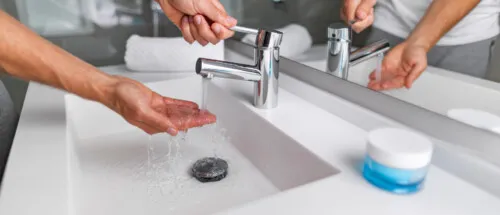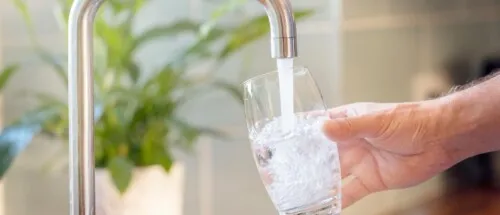Let’s face it – Your water quality should not be the bane of your existence, but it’s essential to a happy and healthy home. We know how important it can be to decompress after a long stressful day, and what better way than with a bubble bath? People all over the world use baths to feel relaxed and rejuvenated, but the hardness of your home’s water can leave you feeling less than refreshed.
The truth is, 85% of households in the United States experience hard water in their homes, which can heavily influence your day-to-day living, whether you realize it or not. Of these homes, only 30% utilize home water softeners, which may have something to do with the numerous misconceptions surrounding them. We’re here to clear the air and dissect these myths, so you can make the best choice for your home and family regarding your water.
1. Softened Water Leaves Slick Film on Your Skin and Doesn’t Rinse off Soap
There is no denying that hard and soft water will leave your skin and hair feeling completely different. Many people think that softened water leaves a slippery film on your skin; however, that just means your water softener is working!
With most U.S. households experiencing hard water, many are used to the texture it leaves on their skin and hair and think it’s normal, but hard water actually leaves behind calcium and magnesium minerals that your body cannot absorb – resulting in dryer and duller skin. Most water softeners work hard to replace these minerals with sodium or potassium if you’re using a salt-less water softener. So, that silkiness you’re feeling is just clean skin and your body’s natural oils without the presence of these minerals.
2. There Is a Lot of Sodium in Softened Water
Many people assume that since traditional water softeners use salt to remove hard water minerals like magnesium and calcium from your water, they must be leaving behind excess sodium. In fact, very little sodium is even present in softened water and not nearly enough to affect the taste or alter your diet. For example, on average, there are 140 milligrams of sodium in a piece of white bread or a glass of milk, while an 8-ounce glass of softened water has less than 20 milligrams. With the FDA recommending no more than 2,300 milligrams of sodium daily, the amount in a glass of soft water is next to nothing.
However, with there being a small amount of sodium present in soft water, it may not be a suitable option for those with high blood pressure or heart and circulation conditions. When you schedule your free water test with Leaf Home Water Solutions, our team of professionals will tailor a unique salt or salt-free solution with your home and health in mind.
3. Water Softeners Remove Essential Minerals That Yours Body Needs
It’s true that water softeners remove hard water minerals that your body cannot absorb, like magnesium and calcium. However, they will never remove any minerals that are vital to your health. Some might ask, “Aren’t calcium and magnesium essential minerals for a healthy body?” The answer is yes, but the magnesium and calcium found in hard water are inorganic forms, and the body is unable to absorb them, making them important to remove.
4. Water Softeners Are a Waste of Energy and Money
While it’s true that water softeners may use additional energy to operate at their full potential, the good they can do for your water and the longevity of your appliances will be worth it. Water softeners can drastically increase the lifespan of your appliances by reducing scale buildup, saving you money in the long run. If you have hard water, you may notice increased scaling on your faucets and showerheads, but have you ever wondered what lies beneath the surface? Scaling is relatively easy to clean and may not seem like a big deal from the outside, but scale buildup within your pipes and water-using appliances can drastically affect their vitality, efficiency, and increase the likelihood of premature breakdowns.
Not only are your washing machines, coffee makers, and dishwashers at risk, but also bigger and more essential appliances like your hot water tank. The Water Quality Research Foundation and Battelle conducted a research study on the benefits of soft water in the home and how it translates into savings. When using soft water, they found that a water heater can maintain its factory efficiency for up to 15 years, but its efficiency and longevity is cut in half with hard water. They also found that some tankless water heaters in hard water homes have failed in as little as 1.5 years, drastically shortening their expected lifespan. So not only will a water softener deliver cleaner, fresher water to your home, but it can also save you money over time – an investment we’re sure you won’t regret.
5. Water Softeners Are Too Expensive for Most People
Another common misconception surrounding water softeners is that they are simply too expensive to own. Not only because of the upfront costs but also because of salt refills, annual maintenance, and increased energy needed to operate. According to a cost analysis done by HomeGuide, the average cost of a water softener is between $10-$20 a month to operate, including salt refills and yearly maintenance for optimal performance. Water softeners can also save you money by reducing the amount of soap and detergent used per cycle and increasing the lifespan of your fabrics.
If the costs still seem out of reach, Leaf Home Water Solutions offers a variety of financing options for those who qualify. Our goal is to make crisper, cleaner water more accessible for everyone. Schedule your free water test today to see how we can upgrade your water and life for good, so you can get back to relaxing, knowing that your home’s water is in the best hands.
Life is hard, but your water doesn’t have to be.



